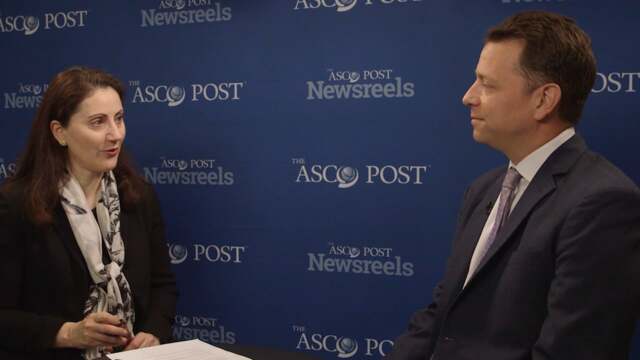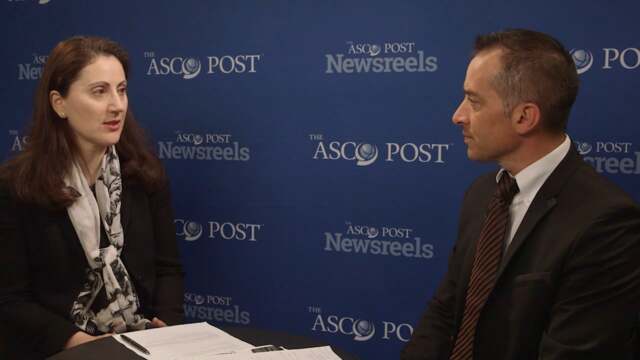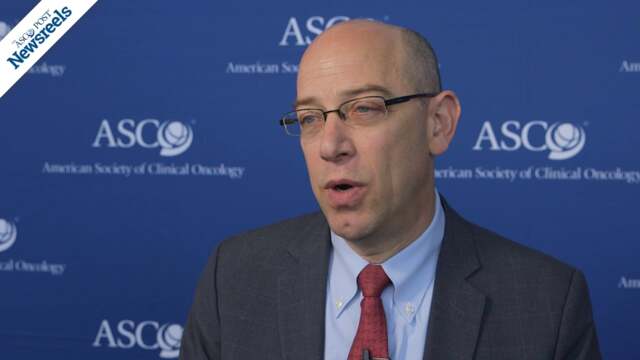Plasma vs Tissue Genotyping and Outcomes With Osimertinib in Advanced Non–Small Cell Lung Cancer
Patients with advanced non–small cell lung cancer (NSCLC) positive for the epidermal growth factor receptor (EGFR) tyrosine kinase inhibitor T790M resistance mutation on a plasma assay had similar outcomes with the EGFR tyrosine kinase inhibitor osimertinib (Tagrisso) as did those who were positive ...
Ceritinib Shows Overall and Intracranial Activity in Advanced NSCLC Previously Treated With Crizotinib and Chemotherapy
Lucio Crinò, MD, of the University Medical School of Perugia, Italy, and colleagues found that ceritinib (Zykadia) was active overall and in central nervous system (CNS) metastases in patients with ALK-rearranged advanced non–small cell lung cancer (NSCLC) previously treated with crizotinib...
Nivolumab in Recurrent Small Cell Lung Cancer
In the phase I/II CheckMate 032 study, nivolumab (Opdivo) alone and with ipilimumab (Yervoy) demonstrated activity in patients with small cell lung cancer (SCLC) progressing after at least one previous platinum regimen, as reported in The Lancet Oncology by Antonia et al. Study Details In the SCLC...
My Oncologists Make Me Feel Safe Even While Living With Terminal Cancer
Looking back, I’m haunted by what might have been if my advanced non–small cell lung cancer (NSCLC) had been caught in its earliest stage, when perhaps a cure was possible. I certainly presented my physicians with enough clues—shortness of breath, coughing, and some body weakness—to have warranted...
Study Finds Computers Surpass Pathologists in Predicting Lung Cancer Type, Severity
Computers can be trained to be more accurate than pathologists in assessing slides of lung cancer tissues, according to a new study by researchers at the Stanford University School of Medicine. The researchers found that a machine-learning approach to identifying critical disease-related features...
Leptomeningeal Metastases More Common in NSCLC With EGFR Mutations, May Be Responsive to Tyrosine Kinase Inhibitors
Leptomeningeal metastases, a serious complication in lung cancer patients, were found to be more prevalent in patients with non–small cell lung cancer (NSCLC) with epidermal growth factor receptor (EGFR) mutations. In a recent study of leptomeningeal metastases published by Li et al in...
Nivolumab Did Not Meet Primary Endpoint of Progression-Free Survival in NSCLC in CheckMate-026 Trial
Bristol-Myers Squibb Company announced last week that CheckMate-026, a phase III trial investigating the use of nivolumab (Opdivo) as monotherapy, did not meet its primary endpoint of progression-free survival in patients with previously untreated advanced non–small cell lung cancer (NSCLC)...
Dabrafenib Plus Trametinib in BRAF V600E–Mutant Metastatic NSCLC
In a phase II trial reported in The Lancet Oncology, Planchard et al found that combined MAPK pathway inhibition with the BRAF inhibitor dabrafenib (Tafinlar) and the MEK inhibitor trametinib (Mekinist) resulted in a high response rate in patients with BRAF V600E–mutant non–small cell lung cancer...
Low-Dose CT Screening: New Solid Nodules and Lung Cancer Probability
As reported by Walter et al in The Lancet Oncology, incidence screening with low-dose computed tomography (CT) in high-risk individuals detected new solid nodules in approximately 5% to 7% at second and third screenings in the ongoing Dutch-Belgian NELSON trial. Larger nodule size was associated...
David LeDuc Named Executive Director of Addario Lung Cancer Foundation
The Bonnie J. Addario Lung Cancer Foundation (ALCF) has announced that it has appointed David LeDuc as its new Executive Director. Mr. LeDuc most recently served as the Senior Director of Strategic Alliances for the Addario Lung Cancer Medical Institute (ALCMI), a partner foundation to ALCF, where ...
Phase III Trial Finds No Survival Benefit of Adding Ipilimumab to Etoposide/Platinum in Extensive-Stage SCLC
The addition of the anti–CTLA-4 (cytotoxic T-lymphocyte–associated protein 4) checkpoint inhibitor ipilimumab (Yervoy) to etoposide/platinum did not improve overall survival in the first-line treatment of patients with extensive-stage small cell lung cancer (SCLC), according to a phase...
AAPM 2016: Somatic Mutations and PET-Based Radiomic Features in Non–Small Cell Lung Cancer
A cutting-edge method of extracting big data from positron-emission tomography (PET) images can provide additional information to quantify lung tumors caused by a genetic mutation. This information could help guide the most effective treatment, suggest findings of a study of nearly 350 patients...
Ceritinib Shows Overall and Intracranial Activity in Advanced NSCLC Previously Treated With Crizotinib and Chemotherapy
Crinò et al found that ceritinib (Zykadia) was active overall and in central nervous system (CNS) metastases in patients with ALK-rearranged advanced non–small cell lung cancer (NSCLC) previously treated with crizotinib (Xalkori) and chemotherapy, according to the ASCEND-2 phase II...
Lung Cancer Screening: Beneficial for Certain Populations but Not Without Controversy
The National Cancer Policy Forum of the National Academies of Sciences took up the issue of lung cancer screening at its mid-June workshop. Greta Massetti, PhD, Associate Director for Science, Division of Cancer Prevention and Control, Centers for Disease Control and Prevention (CDC), and chair of ...
App Triggers Earlier Detection of Relapse, May Help Improve Survival of Patients With Lung Cancer
Web-based applications have invaded mainstream culture and grabbed the attention of multitudes of people around the world. According to a study presented at the 2016 ASCO Annual Meeting, an app may also contribute to extending the lives of people with cancer and, at the same time, reduce...
Swiss Study Examines Cost-Effectiveness of Nivolumab vs Docetaxel in Advanced Nonsquamous NSCLC
Nivolumab, a checkpoint inhibitor approved for patients with squamous and nonsquamous non–small cell lung cancer (NSCLC) in 2015, is not cost-effective when compared to treatment with docetaxel, chemotherapy medication. However, a Swiss analysis showed the cost-effectiveness of nivolumab is...
Plasma vs Tissue Genotyping and Outcomes With Osimertinib in Advanced Non–Small Cell Lung Cancer
Patients with advanced non–small cell lung cancer (NSCLC) positive for the epidermal growth factor receptor (EGFR) tyrosine kinase inhibitor T790M resistance mutation on a plasma assay had similar outcomes with the EGFR tyrosine kinase inhibitor osimertinib (Tagrisso) as did those who were...
First-Line Nivolumab Monotherapy Active in Advanced NSCLC
As part of the phase I CheckMate 012 study reported by Gettinger et al in the Journal of Clinical Oncology, nivolumab (Opdivo) monotherapy was found to be active as first-line treatment in advanced non–small cell lung cancer (NSCLC). The study is also examining first-line nivolumab plus...
First-Line Nivolumab Active in Combination With Platinum-Based Doublets in Advanced NSCLC
Nivolumab (Opdivo) was found to be active combined with platinum-based doublets as first-line treatment of advanced non–small cell lung cancer (NSCLC), as part of the phase I CheckMate 012 study reported by Rizvi et al in the Journal of Clinical Oncology. The study is also evaluating...
Routine Prophylactic vs Deferred Radiotherapy for Procedure-Tract Metastases in Malignant Pleural Mesothelioma
Prophylactic radiotherapy after surgery and large-bore pleural procedures did not result in significant reduction in the incidence of procedure-tract metastases in malignant pleural mesothelioma, according to the UK phase III SMART trial reported by Clive et al in The Lancet Oncology. Study...
FDG–PET Evaluates Immunotherapy for Non–Small Cell Lung Cancer
Researchers at the 2016 Annual Meeting of the Society of Nuclear Medicine and Molecular Imaging (SNMMI) presented study findings on a means of evaluating an immunotherapy for non–small cell lung cancer (NSCLC).1 Due to NSCLC’s relative insensitivity to chemotherapy, the use of immunotherapies,...
Combination of Nivolumab and Ipilimumab Moves Forward in NSCLC
How best to combine new immunotherapies is a burning question in oncology. A new study in the CheckMate series suggests that nivolumab (Opdivo) and ipilimumab (Yervoy) can be safely and effectively combined as first-line treatment of advanced non–small cell lung cancer (NSCLC),1 but further study...
CAP, IASLC, and AMP Seek Public Comments on Revised Lung Cancer Molecular Testing Guideline
The College of American Pathologists (CAP), the International Association for the Study of Lung Cancer (IASLC), and the Association for Molecular Pathology (AMP) announced today the open comment period for the revised evidence-based guideline, “Molecular Testing Guideline for Selection of...
Is Nivolumab Active in Recurrent Small Cell Lung Cancer?
In the phase I/II CheckMate 032 study, nivolumab (Opdivo) alone and with ipilimumab (Yervoy) demonstrated activity in patients with small cell lung cancer (SCLC) progressing after at least one previous platinum regimen, as reported in The Lancet Oncology by Antonia et al. Study Details In the...
Dabrafenib Plus Trametinib Shows Activity in BRAF V600E–Mutant Metastatic NSCLC
In a phase II trial reported in The Lancet Oncology, Planchard et al found that combined MAPK pathway inhibition with the BRAF inhibitor dabrafenib (Tafinlar) and the MEK inhibitor trametinib (Mekinist) resulted in a high response rate in patients with BRAF V600E–mutant non–small cell...
Impressive Early Data for Rovalpituzumab Tesirine in Small Cell Lung Cancer
Initial encouraging news from a first-in-human trial suggests that the antibody-drug conjugate rovalpituzumab tesirine (Rova-T) may turn out to be a new option for patients with small cell lung cancer (SCLC) whose tumors overexpress delta-like protein 3 (DLL3). Study results were presented at the...
Once-Daily Radiation (66 Gy) Appears No Better Than Twice-Daily Radiation (45 Gy) for Small Cell Lung Cancer
A schedule of once-daily radiation therapy (66 Gy) was no better than a twice-daily schedule (45 Gy) for optimization of chemoradiotherapy in patients with limited-stage small cell lung cancer (SCLC), according to the eagerly anticipated results of the phase III CONVERT trial, presented at the...
Matching Treatment to Tumor Abnormalities Seems to Pay Off
A strategy of matching molecular abnormalities in patients’ tumors to therapies targeted to those abnormalities is gaining ground, according to preliminary results of the phase IIb MyPathway study presented at the 2016 ASCO Annual Meeting.1 These are still early days for this “matching” strategy,...
Pembrolizumab Active for Untreated/Progressive Brain Metastases in Melanoma or NSCLC
Goldberg et al found that pembrolizumab (Keytruda) was active in untreated or progressive brain metastases in melanoma and non–small cell lung cancer (NSCLC), according to a single-center phase II trial reported in The Lancet Oncology. Study Details The study included 36 patients at Yale...
Low-Dose CT Screening May Detect New Solid Nodules and Lung Cancer Probability
As reported by Walter et al in The Lancet Oncology, incidence screening with low-dose computed tomography (CT) in high-risk individuals detected new solid nodules in approximately 5% to 7% at second and third screenings in the ongoing Dutch-Belgian NELSON trial. Larger nodule size was associated...
Luis G. Paz-Ares, MD, PhD, on NSCLC: Results from the SQUIRE Trial (Spanish Language Version)
Luis G. Paz-Ares, MD, PhD, of the Hospital Universitario 12 De Octubre, discusses in Spanish study findings on adding necitumumab to gemcitabine and cisplatin chemotherapy in the first-line treatment of patients with stage IV squamous non–small cell lung cancer. To see the English language version of this video, please click here.
SNMMI 2016: FDG-PET Evaluates Immunotherapy for Non–Small Cell Lung Cancer
Researchers at the 2016 Annual Meeting of the Society of Nuclear Medicine and Molecular Imaging (SNMMI) presented a means of evaluating an immunotherapy that fights off non–small cell lung cancer (NSCLC) by strengthening a patient’s own immune system (Scientific Paper 134). Due to...
Many Family Physicians May Be Misinformed About Lung Cancer Screening
Although clinical trials have shown that lung cancer screening using low-dose computed tomography (CT) can detect lung cancers early and reduce lung cancer mortality, less than half of family physicians in a recent survey agreed that screening reduces lung cancer–related deaths. Most were...
Adjuvant Chemotherapy in Early-Stage Non–Small Cell Lung Cancer Improves Overall Survival
The use of adjuvant chemotherapy in early-stage non–small cell lung cancer (NSCLC) patients improves overall survival and 5-year overall survival rates in patients with tumor sizes ranging from 3 to 7 cm. These findings were published by Morgensztern et al in the Journal of Thoracic...
Fabrice Denis, MD, PhD, on Lung Cancer: Improving OS With an App (French Language Version)
Fabrice Denis, MD, PhD, of the Institut Inter-regional de Cancérologie Jean Bernard, discusses findings from a phase III trial on an app used between visits for early detection of symptomatic relapse and complications in high-risk lung cancer patients (Abstract LBA9006). To see the English language version of this discussion, click here.
Pembrolizumab Improves Survival vs Docetaxel in Previously Treated PD-L1–Positive Advanced Non–Small Cell Lung Cancer
As reported in The Lancet by Roy S. Herbst, MD, PhD, of Yale School of Medicine, and colleagues,1 the phase II/III KEYNOTE-010 trial showed that pembrolizumab (Keytruda) significantly improved overall survival vs docetaxel in patients with previously treated programmed cell death ligand 1...
Vali A. Papadimitrakopoulou, MD, and Heather A. Wakelee, MD, on Bevacizumab for Early-Stage NSCLC
Vali A. Papadimitrakopoulou, MD, of MD Anderson Cancer Center, and Heather A. Wakelee, MD, of Stanford University, discuss findings on adjuvant chemotherapy with or without bevacizumab for early-stage non–small cell lung cancer, with outcomes based on chemotherapy subsets (Abstract 8507).
Vali A. Papadimitrakopoulou, MD, and Gideon Michael Blumenthal, MD, on NSCLC: An Updated Pooled Analysis
Vali A. Papadimitrakopoulou, MD, of MD Anderson Cancer Center, and Gideon Michael Blumenthal, MD, of the US Food and Drug Administration, discuss milestone analyses with immune checkpoint inhibitors, targeted therapy, and standard therapy in metastatic non–small cell lung cancer trials submitted to the FDA (Abstract 9010).
Vali A. Papadimitrakopoulou, MD, and Fabrice Denis, MD, PhD, on Lung Cancer: Improving Survival With an App
Vali A. Papadimitrakopoulou, MD, of MD Anderson Cancer Center, and Fabrice Denis, MD, PhD, of the Institut Inter-regional de Cancérologie Jean Bernard, discuss findings from a phase III trial on an app used between visits for early detection of symptomatic relapse and complications in high-risk lung cancer patients (Abstract LBA9006). To see Dr. Denis discuss this study in French, click here. To see the French language version of this discussion, click here.
Charles M. Rudin, MD, PhD, on SCLC: Findings on Rovalpituzumab Tesirine
Charles M. Rudin, MD, PhD, of Memorial Sloan Kettering Cancer Center, reports on the encouraging anti-tumor activity of this antibody drug conjugate against one of the most deadly malignancies: recurrent or refractory small cell lung cancer (Abstract LBA8505).
ASCO 2016: Study Finds Use of Mobile Web App Associated With Improved Outcomes in Lung Cancer
A Web-mediated follow-up application (app; Moovcare™) improved advanced lung cancer survival, according to a French multicenter randomized phase III study. Researchers analyzed the association and evolution of self-reported clinical symptoms over time. The median overall survival of patients...
ASCO 2016: New Antibody-Drug Conjugate Shows Early Promise in Small Cell Lung Cancer
Early findings from a first-in-human clinical trial showed that the antibody-drug conjugate rovalpituzumab tesirine (Rova-T) shows promising efficacy against recurrent small cell lung cancer (SCLC). The treatment, which combines a novel anti-DLL3 antibody with a powerful anticancer agent, halted...
Luis G. Paz-Ares, MD, PhD, on NSCLC: Results From the SQUIRE Trial
Luis G. Paz-Ares, MD, PhD, of the Hospital Universitario 12 De Octubre, discusses study findings on adding necitumumab to gemcitabine and cisplatin chemotherapy in the first-line treatment of patients with stage IV squamous non-small cell lung cancer. To see Dr. Paz-Ares discuss this video in Spanish, please click here.
ASCO 2016: Nivolumab Alone or in Combination With Ipilimumab Active in Recurrent Small Cell Lung Cancer
A study presented by Antonia et al at the 2016 ASCO Annual Meeting (Abstract 100) showed that utilizing the immunotherapeutic agents nivolumab (Opdivo) and ipilimumab (Yervoy) could lead to more effective treatment options for patients with small cell lung cancer (SCLC) who have progressed after...
FDA Approves EGFR Mutation–Detecting Blood Test for Non–Small Cell Lung Cancer
The U.S. Food and Drug Administration (FDA) today approved the cobas EGFR Mutation Test v2, a blood-based companion diagnostic for the epidermal growth factor receptor (EGFR) inhibitor erlotinib (Tarceva). This is the first FDA-approved, blood-based genetic test that can detect EGFR gene mutations...
ODAC Advises the FDA to Wait for Phase III Results for Rociletinib in Non–Small Cell Lung Cancer
The U.S. Food and Drug Administration’s (FDA) Oncologic Drugs Advisory Committee (ODAC) met April 12 to consider a New Drug Application by Clovis Oncology for rociletinib, an investigational therapy for epidermal growth factor receptor (EGFR)-mutated non–small cell lung cancer (NSCLC) in patients...
NCCN Clinical Practice Guidelines in Oncology (NCCN Guidelines®): 2016 Guidelines
In 1996, the National Comprehensive Cancer Network (NCCN®) published its first set of Clinical Practice Guidelines in Oncology® (NCCN Guidelines®), covering eight tumor types. The NCCN Guidelines® are now published for more than 60 tumor types and topics. Some of the key updates for 2016 were...
Use of ROS1 Immunohistochemical Staining in Screening for ROS1 Translocations in Lung Cancer
Immunohistochemistry (IHC) is an effective tool that can be used for identifying proto-oncogene 1 receptor tyrosine kinase (ROS1) gene rearrangements and screening patients for the administration of the targeted therapy crizotinib (Xalkori), a small-molecule tyrosine kinase inhibitor. Chromosomal...
AATS 2016: Stage IIIA NSCLC Survival Rates Improved When Care Included Four Specific Quality Measures
Current guidelines from the National Comprehensive Cancer Network (NCCN) and American College of Chest Physicians (ACCP) recommend that operable patients with clinical stage IIIA non–small cell lung cancer (NSCLC) should receive induction chemotherapy (with or without concurrent radiotherapy) ...
Adjuvant MAGE-A3 Immunotherapeutic Shows No Benefit in Resected MAGE-A3–Positive NSCLC
In the phase III MAGRIT trial reported in The Lancet Oncology, Vansteenkiste et al found that adjuvant therapy with the MAGE-A3 cancer immunotherapeutic did not improve disease-free survival in patients with resected MAGE-A3–positive non–small cell lung cancer (NSCLC). The...







